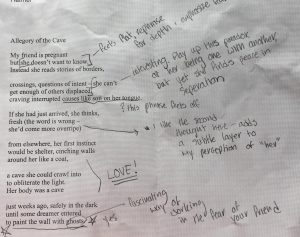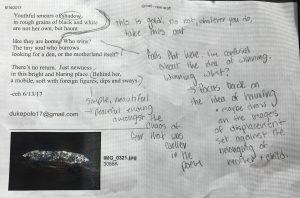First Draft
Allegory of the Cave
My friend is pregnant
but she doesn’t want to know.
Instead she reads stories of borders,
crossings, questions of intent – she can’t
get enough of others displaced,
craving interrupted causes like soil on her tongue.
If she had just arrived, she thinks,
fresh (the word is wrong –
she’d come more overripe)
from elsewhere, her first instinct
would be shelter, cinching walls
around her like a coat,
a cave she could crawl into
to obliterate the light.
Her body was a cave
just weeks ago, safely in the dark
until some dreamer entered
to paint the wall with ghosts.
Youthful smears of shadow
in rough grains of black and white
are not her own, but haunt
like they are home. Who wins?
The tiny soul who burrows
looking for a den, or the motherland itself?
There’s no return. Just newness
in this bright and blaring place. Behind her,
a mobile, soft with foreign figures, dips and sways.
_____
Annotations from Brooke


Second Draft
Allegory of the Cave
In the waiting room, the pregnant woman
resists the knowledge dangling in the air,
a mobile, figurines looming.
For distraction, she reads stories:
borders, crossings, questions of intent –
can’t get enough
of others displaced. She craves
interrupted causes,
pique of ashes on her tongue.
If she were now arriving,
fresh (the word is wrong –
she’d come more overripe)
from elsewhere, her first instinct
would be shelter, cinching walls
around her like a coat,
a cave she could crawl into
to obliterate the light.
Just weeks ago her body was a cave
safely in the dark
until some dreamer entered
to paint the wall with ghosts,
smears of blurry shadow
in rough grains of black and white. Not hers,
they haunt like they are home.
Refugee or refuge: the motherland
is both, a nation on the run from what it hides.
From this small treaty, she knows, no retreat.
The bargain struck, she turns her back
one moment more
on this bright and blaring place,
its jangled anthem,
where soft shapes in their suspension
dip and sway.
_____
This is better with a more concrete setting to ground the abstractions. I want the woman to reach (uneasy) reconciliation with this pregnancy, while still preserving her ignorance for another moment before acknowledging the facts. I’m working to keep and cue the ashes on the tongue (no longer soil) as pica, where the ashes are also the former life of the refugee/woman, now gone.
I really want the motherland duality to work, and I’d like to know if this is closer to making some sort of sense by the end, where I’m toying with more “nation” language and another stanza in the mix. Mostly, I don’t want it to code as an abortion dilemma, but a reckoning with the grieving of autonomy women aren’t often allowed to admit. My other hope is that the Plato allusion in the title rings clear in the poem – she’d rather resist the truth by staying deep inside the cave (her ignorance), but someone else intrudes, forcing her to the light.